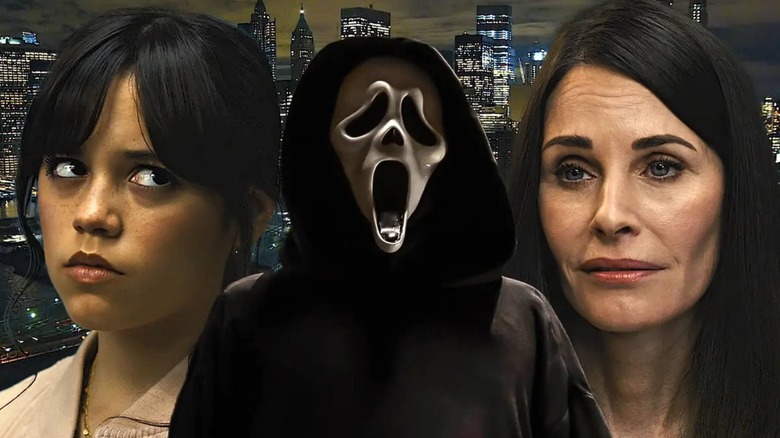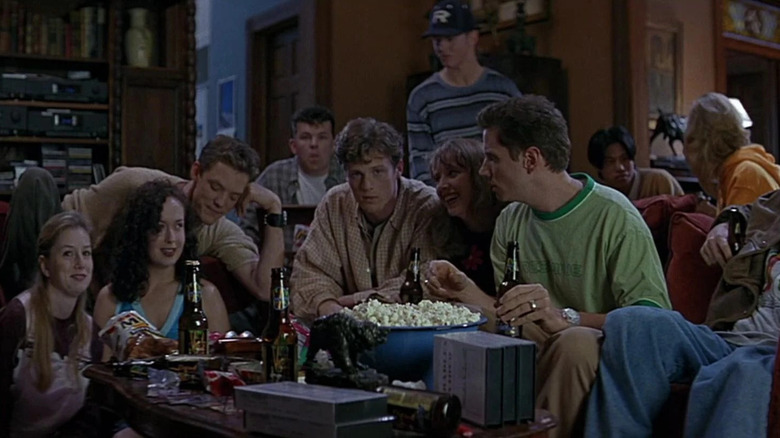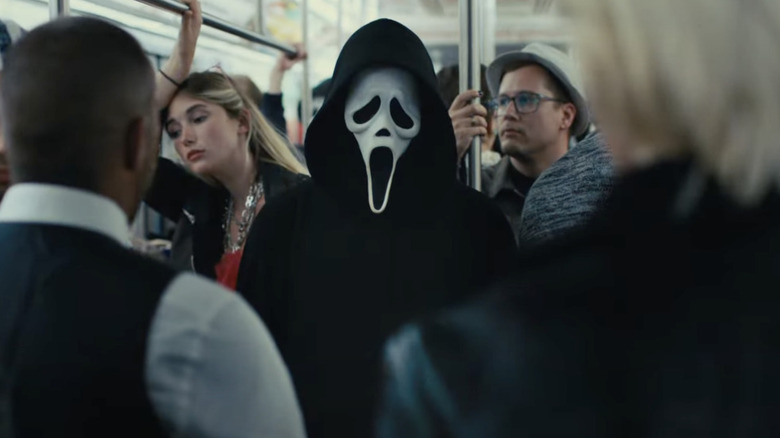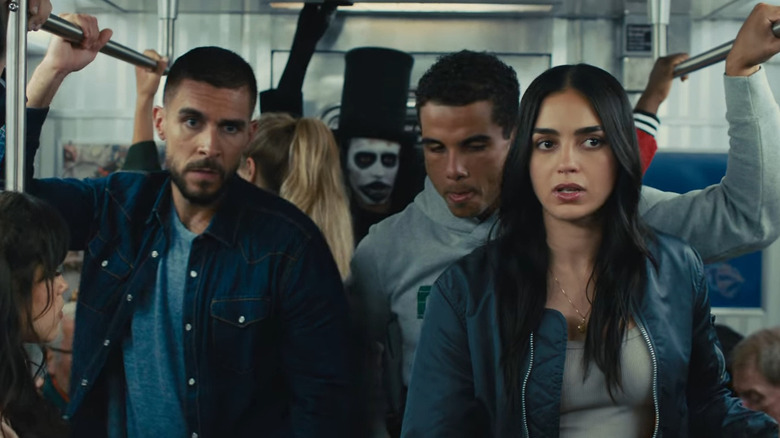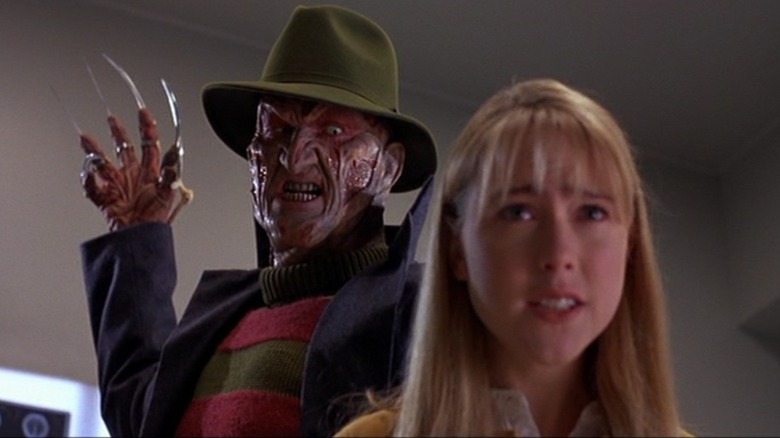Scream's Postmodern Edge Has Gone Dull & The Franchise Needs Some Cutting New Critiques
Contains spoilers for "Scream 6"
The influence of 1996's "Scream" can't be overstated. It wasn't the first time meta-humor had been used in a horror film. It wasn't even the first time meta-humor was used in a horror film directed by Wes Craven, who experimented with the idea a couple of years earlier in "Wes Craven's New Nightmare." However, it's safe to say "Scream" perfected the formula. It was a horror movie commenting on the tropes and themes present in modern horror movies, specifically slashers. The characters were as obsessed with scary movies as the audience watching the film, allowing the movie to subvert both the characters' expectations and our own.
However, postmodernism and the horror genre have changed dramatically since 1996. Horror has gone through numerous crazes and trends, from torture porn to found footage to experimental A24-style. As a result, the most recent "Scream" movies feel more like relics of a bygone era, with the commentary on the genre feeling out of place — especially seeing how slashers aren't a prominent genre anymore outside of large franchises, like "Scream" and "Halloween." Even an original slasher, like 2022's "X," is set in the 1970s, giving it a throwback feel.
That's not to say 2022's "Scream" or the more recent "Scream 6" are bad; on the contrary, they're both solid installments of the franchise that simultaneously introduce compelling new characters while paying homage to what's come before. But the meta-commentary on horror movies feels out of place in this day and age, and for the franchise to continue in bold new directions, it needs a change-up.
Postmodernism is kind of played out
Postmodernism in film was a bit of a novelty in the 1990s. 30 years later, it feels like everything — even things that aren't necessarily billed as comedies — engages in meta-humor. Plenty of TV shows, from "Supernatural" to "Rick and Morty," regularly point out the tropes of being a TV show. And the Marvel Cinematic Universe, the biggest movie franchise out there right now, regularly gets meta. In "Avengers: Endgame," one of the most financially successful films of all time, there's a scene where Rhodey (Don Cheadle) asks Captain America (Chris Evans) why he didn't jump out of the plane before crashing it in "Captain America: The First Avenger." The franchise comments on itself! That's meta!
And since "Scream," the horror genre has been particularly susceptible to commenting on itself. Just some of the meta examples of horror over the last couple of decades include "The Cabin in the Woods," "Funny Games," Tucker and Dale vs. Evil," "John Dies at the End," and "Zombieland," to name a few. Even "Get Out" has a character tell the lead, Chris (Daniel Kaluuya), that he shouldn't go to his girlfriend's parents' house because something could go wrong, like in a scary movie.
Now, postmodern humor isn't in and of itself a good or bad thing. It's been done incredibly well, and it can be done poorly. So it's not that the "Scream" franchise is doing anything wrong; it's just that it exists in an oversaturated marketplace where commenting on the tropes of horror movies is no longer novel. Having characters in the films go over the "rules" of horror movies feels superfluous because the audience has seen it done to death at this point.
Scream isn't really interested in making fun of horror anymore
2022's "Scream" and 2023's "Scream 6" still satirize elements of horror. However, there's been a renewed interest in specifically calling attention to ideas found within franchise filmmaking. 2022's "Scream" (really annoying they didn't just call that one "Scream 5") is billed as a "requel" much like 2018's "Halloween" and "The Force Awakens." It's a sequel but also a revival of a franchise that had been dormant for 11 years, in line with trends from Hollywood as of late. As such, it has all the cliches of a revival like this. It's hard not to see parallels between Dewey's (David Arquette) death and the sacrifice of Han Solo (Harrison Ford) in "The Force Awakens."
"Scream 6" carries on this trajectory. Mindy (Jasmin Savoy Brown) gives a whole monologue about how they're no longer in a series but a "franchise." She lays out the ground rules of such a franchise, such as how legacy characters are fair game in the vein of Luke Skywalker and Tony Stark because the franchise is a brand name at this point and bigger than any one player. This comes to fruition once Gale (Courteney Cox) becomes a target of Ghostface, barely surviving in the process.
The recent "Scream" movies have more to say about Hollywood as a mechanism rather than specifically horror, which is what the series originally set out to do. There are still plenty of scares and some great tension-building, but it doesn't feel as necessary to the horror genre specifically as when "Scream" first came out in 1996. It requires some revitalization to feel fresh again and like it's actually adding something to horror as a whole.
Scream needs a reason to exist
Despite nods to how Hollywood approaches franchise filmmaking, "Scream 6" seems stuck in the past, which is bound to happen when a series has been going on for nearly 30 years. These movies can now comment on themselves, as evidenced by there being a literal shrine to past Ghostface killers in the most recent installment. At one point, a character even says, "F*** this franchise" — meaning if the characters themselves are getting tired of the same beats happening, will the audience follow suit?
The series needs to find an answer to the question, "What else is there to say about horror movies?" There have been so many subversions to the genre at this point that audiences actually expect subversions to those subversions. And how do you comment on something more diverse than ever? "Barbarian" is completely different from "Nope," which is completely different from "Bodies Bodies Bodies." If anything, modern horror could best be defined as "elevated horror," which places less emphasis on direct scares and a greater focus on heavy themes like grief and trauma. "Scream 6" actually somewhat falls into that category as Sam (Melissa Barrera) goes to therapy to better handle the events of the last film and hallucinates her father, Billy Loomis (Skeet Ulrich), who provides her Green Goblin-esque advice to give in to her inner killer instincts.
But perhaps the best thing for the "Scream" franchise to do for its future is to look toward the past.
Scream needs a new nightmare
Remember "Wes Craven's New Nightmare" mentioned earlier? It brought back series mainstays Heather Langenkamp and Robert Englund, who play themselves as well as their characters from the "Nightmare on Elm Street" franchise. They're then stalked by an actual Freddie Krueger in the real world. It may have been too meta for the time, but that kind of premise may be exactly what "Scream" needs to remain viable.
In keeping with the spirit of lampooning franchise films in general, it would make sense to have the actors of the "Scream" franchise play themselves. This not only includes the current stars of the movies but everyone who's come before, from Matthew Lillard to Drew Barrymore. Franchise films often bring back the original cast, like how "Jurassic World Dominion" brought back the original trio of stars from "Jurassic Park." That's obviously harder to pull off in a series where most of the characters wind up dead, which is why an ultra-meta perspective could be exactly what's needed.
The plot could focus on the entire ensemble of the "Scream" franchise getting together for a big convention retrospective. They all play themselves to talk about the impact of the franchise when a real-life Ghostface starts picking them off one by one. It would allow the series to directly comment on itself rather than work through the fictitious "Stab" movies that have populated "Scream." The meta-ness of "Scream" is at risk of growing stale, so the only solution is to go even harder on meta-ness and readily admit that "Scream" is a film franchise with a long legacy of attracting top-tier talent. It would be a unique take on the series and bring it full circle to Wes Craven's origins.
"Scream 7" seems all but a certainty, so why not play with the formula and analyze what "Scream" really means in the lexicon of horror iconography? And yes, there can still be spooky phone calls.
